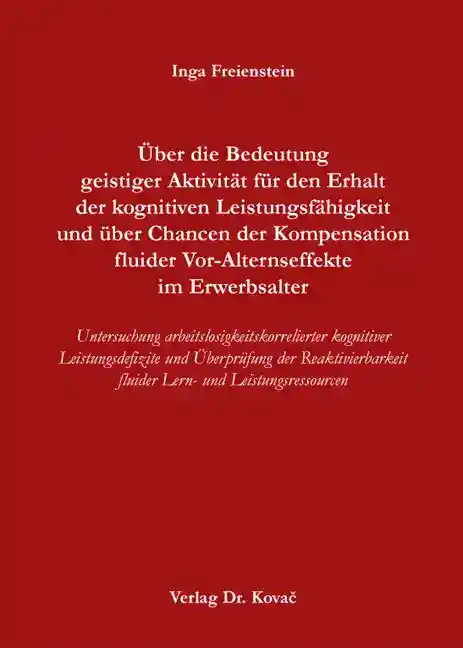Inga FreiensteinÜber die Bedeutung geistiger Aktivität für den Erhalt der kognitiven Leistungsfähigkeit und über Chancen der Kompensation fluider Vor-Alternseffekte im Erwerbsalter
Untersuchung arbeitslosigkeitskorrelierter kognitiver Leistungsdefizite und Überprüfung der Reaktivierbarkeit fluider Lern- und Leistungsressourcen
Schriften zur Arbeits-, Betriebs- und Organisationspsychologie, volume 69
Hamburg 2013, 216 pages
ISBN 978-3-8300-7452-6 (print) |ISBN 978-3-339-07452-2 (eBook)
About this book deutschenglish
This study is based on cross-sectional data collected from over 4,500 people experiencing long-term unemployment who took part in a four-week occupational activation program. The research is based on data collected using the I-S-T 2000 R (enhanced version, Liepmann, Beauducel, Brocke & Amthauer, 2007), which is structured on the dual-factor model of fluid and crystallized intelligence as proposed by Cattell (1963, 1987). One of the primary objectives was to test Hacker's hypothesis that unemployment can induce pre-aging (Hacker, 2003, 2006) and to differentiate related phenomena from the disuse hypothesis (Lehr, 1977, 1988; Warr, 1998, 2001). Corresponding to both hypotheses, a positively skewed distribution of age-adjusted performance on measures of fluid and crystallized intelligence was found, which diverged among the study subjects by an average of ca. 10 IQ points from normal distribution. Using the I-S-T 2000 R (enh., Liepmann et al., 2007) as well as an additional method for measuring fluid intelligence, small, statistically significant negative correlations were found between performance on measures of fluid intelligence and the duration of unemployment. In the control study, using the I-S-T 2000 R (enh.), these correlations were replicated for subjects who had been unemployed for 5 years or longer. Thus, based on the theory, it is possible to interpret the cross-sectional findings as an estimate of longitudinal correlations between unemployment and a diminished fluid intelligence (cf. Baltes, Mayer, Helmchen & Steinhagen-Tiessen, 2010), for which a causal relationship is assumed. In contrast, there was no unambiguous evidence among the educationally disadvantaged survey population for unemployment-correlated losses in crystallized intelligence as stated in the disuse hypothesis. Based on multiple regression analyses, the tentative conclusion could be drawn that the shielding effects of a neuro-protective lifestyle (or the lack thereof) influence fluid performance among subjects experiencing long-term unemployment. A significant relationship between age and the fluid factor gf (for which age-related variance has already been minimized) also allows us to infer a pre-aging effect. The designs for the investigation of treatment effects suggest that fluid learning and performance resources can be reactivated through treatment. This reactivation is accompanied by a significant increase in self-efficacy expectations (Schwarzer & Jerusalem, 1999).Keywords
ArbeitslosigkeitsforschungArbeitslosigkeitsinduziertes Vor-AlternDisuse-AnsatzDisuse-HypotheseFluide Intelligenzentwicklung gem. I-S-T 2000 RFluide PlastizitätIntelligenzdiagnostikIntelligenzstrukturforschungKognitionspsychologieKristallisierte Intelligenz gem. I-S-T 2000 RTraining kognitiver Lern- und LeistungsressoucenVor-Altern im ErwerbsalterIhr Werk im Verlag Dr. Kovač

Möchten Sie Ihre wissenschaftliche Arbeit publizieren? Erfahren Sie mehr über unsere günstigen Konditionen und unseren Service für Autorinnen und Autoren.
